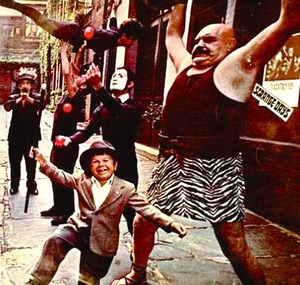Fact #113808
When:
Short story:
 Strange Days, the second album by The Doors, is released on Elektra Records (via Polydor) in the USA.
Strange Days, the second album by The Doors, is released on Elektra Records (via Polydor) in the USA.Full article:
Robby Krieger (guitarist, The Doors) : Jim came up to my house in Laurel Canyon one night, and he was in one of his suicidal, downer moods. So John (drummer John Densmore) said, “Come on, Jim, we’ll go see the sunset. That’ll get you out of this.” We went up to the top of Laurel Canyon and it was incredibly beautiful - we were looking down on the sun reflecting off the top of the clouds. Jim had a total mood flip-flop, and said, “Wow! Now I know why I felt like that. It’s because if you’re strange, people are strange.” And he wrote the lyrics right there. Then I came up with the music and we went back down the hill.
(For Horse Latitudes) He said he had a poem he wanted to read and he wanted something real weird to back it. There were all these instruments in the studio from an orchestra session — harpsichords and pianos and timpani. We all started banging on them and fumbling around inside the pianos, and there were 10 or 12 people just screaming at the top of their lungs. After we laid that down, Jim overdubbed the poem.
The funny thing was, as we were listening back at full volume and Jim was reading, the guys from the Jefferson Airplane came straggling in — high as kites, or course. They stared at us like we were out of our minds, but we just acted casual and said, “Oh yeah, this is one of our songs.
When the Music’s Over was similar to The End in length and structure, but so what? Something works, so you do it again. It’s one of my favorite songs.
That solo was really a challenge because the harmony is static. I had to play 56 bars over the same riff, which isn’t easy. It’s a lot easier to play something over an interesting chord progression. But we did that a lot because we were really into [saxophonist] John Coltrane, who pioneered “modal” jazz and soloed brilliantly over static harmonies and minimal chord progressions. I was always trying to play something that sounded like him - just totally out there in terms of tonality. I think “When the Music’s Over” is the closest I ever came.
One time, we were getting ready to leave for the night and Jim didn’t want to stop because he was feeling good. He kept saying, “Man, I want to play all night.” But we were all tired and wanted to go home. Jim finally left, but he came back half an hour later, climbed over the fence, broke into the studio, took out the fire extinguisher and sprayed it into the piano and all over everything. It was quite a surprise in the morning.
(Source : interview with Alan Paul of Guitar World, 2014)
Tweet this Fact
(For Horse Latitudes) He said he had a poem he wanted to read and he wanted something real weird to back it. There were all these instruments in the studio from an orchestra session — harpsichords and pianos and timpani. We all started banging on them and fumbling around inside the pianos, and there were 10 or 12 people just screaming at the top of their lungs. After we laid that down, Jim overdubbed the poem.
The funny thing was, as we were listening back at full volume and Jim was reading, the guys from the Jefferson Airplane came straggling in — high as kites, or course. They stared at us like we were out of our minds, but we just acted casual and said, “Oh yeah, this is one of our songs.
When the Music’s Over was similar to The End in length and structure, but so what? Something works, so you do it again. It’s one of my favorite songs.
That solo was really a challenge because the harmony is static. I had to play 56 bars over the same riff, which isn’t easy. It’s a lot easier to play something over an interesting chord progression. But we did that a lot because we were really into [saxophonist] John Coltrane, who pioneered “modal” jazz and soloed brilliantly over static harmonies and minimal chord progressions. I was always trying to play something that sounded like him - just totally out there in terms of tonality. I think “When the Music’s Over” is the closest I ever came.
One time, we were getting ready to leave for the night and Jim didn’t want to stop because he was feeling good. He kept saying, “Man, I want to play all night.” But we were all tired and wanted to go home. Jim finally left, but he came back half an hour later, climbed over the fence, broke into the studio, took out the fire extinguisher and sprayed it into the piano and all over everything. It was quite a surprise in the morning.
(Source : interview with Alan Paul of Guitar World, 2014)